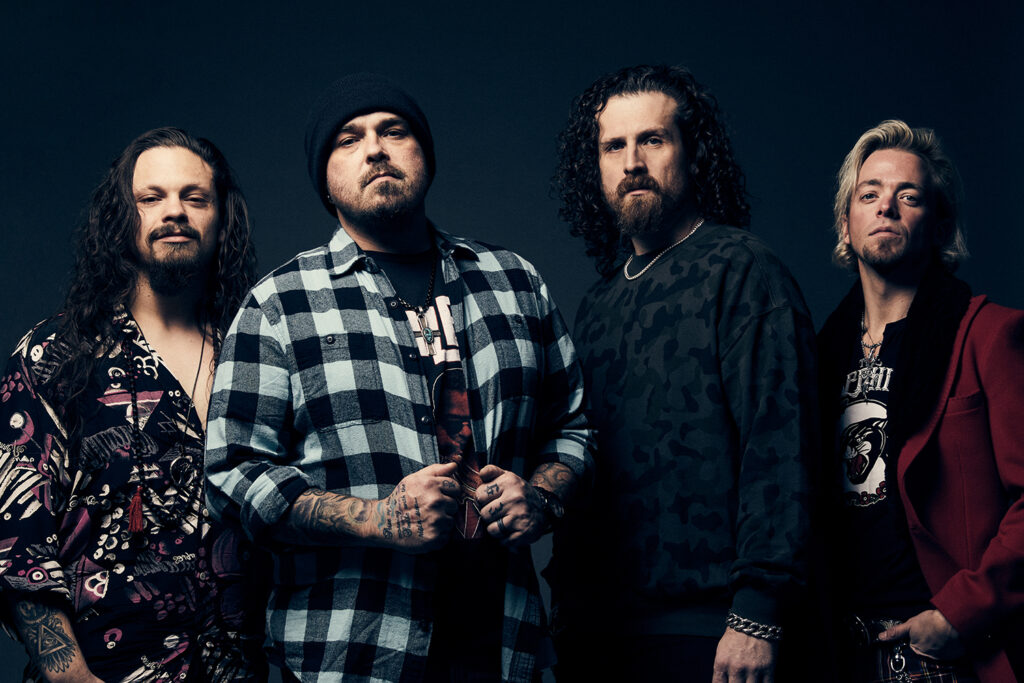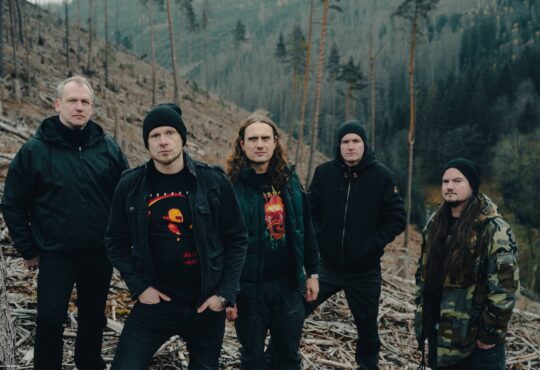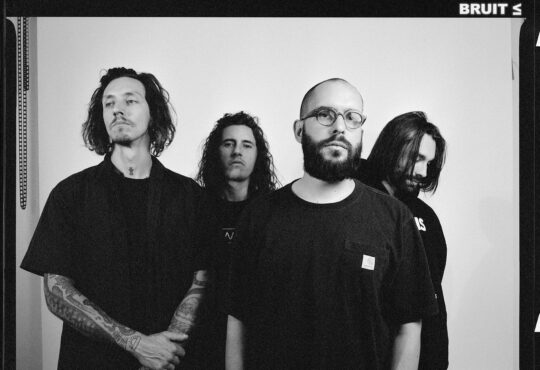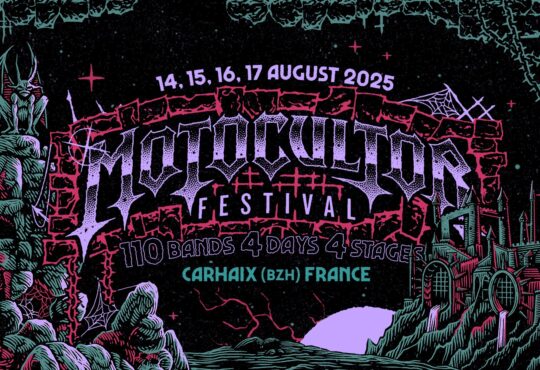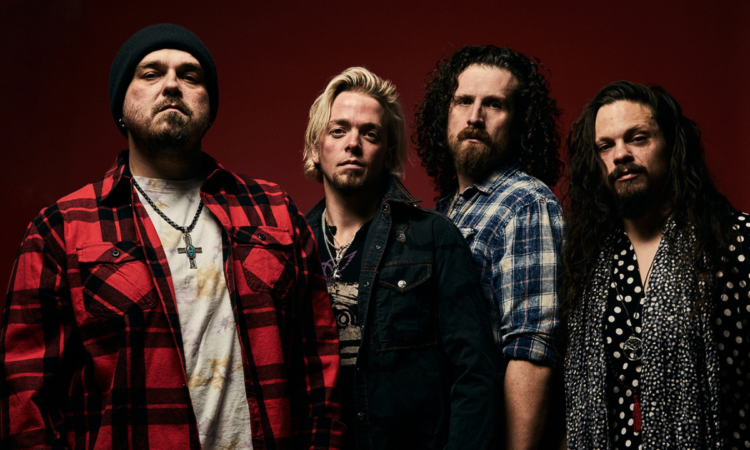
Discover what Chris Robertson of Black Stone Cherry has to say about new album Screamin’ At The Sky and the band’s musical evolution in this interview.
Three years have passed since The Human Condition, and this time, there’s no pandemic, so your promotional plans have changed as well. Can you share your experience during those challenging years, similar to other bands?
Chris Roberton (vocals/guitar): It’s all kind of still the same, just like this interview. It seems like Zoom is now the way. Everything shifted to Zoom. But I’m just happy to see concerts happening again on a regular basis. To be honest with you, above everything, I’m glad to see people able to get out and live life again. Honestly, that was the hardest part of the entire last couple of years: people not being able to live a regular life.
Do you find that Screamin’ At The Sky carries a cathartic essence, as suggested by the title, the cover, the lyrics, and the energy of the new tracks? Was this a natural aspect during the writing process, and does it still resonate with you?
Chris: Yeah, I think this whole record was about letting go of a lot. I’m moving on because in life, when you face adversity, your options are clear: you have no choice but to let go. And then, after that, you can either stay stuck or move forward. I heard a great quote yesterday: ‘There’s a reason the windshield is a lot bigger than the rear-view mirror because what’s in front of you matters more than what is behind you‘. I wholeheartedly agree with that sentiment, and I believe Jelly Roll was the one who said it. It’s the truth, man. You can either stay stuck or move forward. Any progress moving forward is great progress, and that’s what life is now – keeping moving forward.
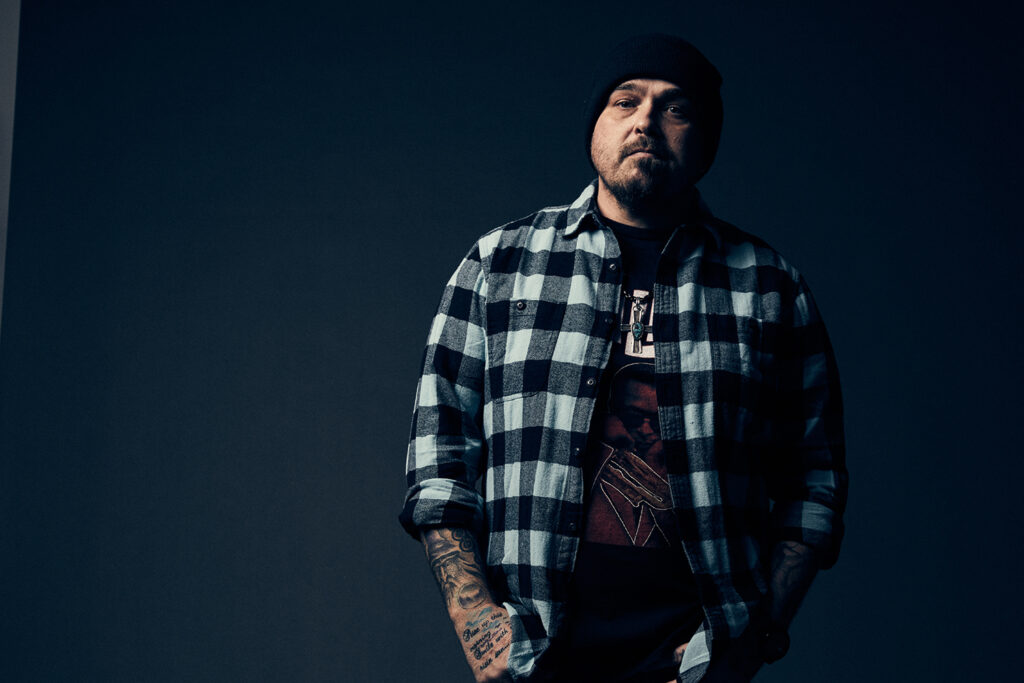
Did those events influence your writing or creative process, and were you consciously aware of it? Or did you simply integrate everything and approach your music in the same way you always have?
Chris: The music was written much like our usual process. It typically begins with an idea and then evolves from there. With Steve joining us, there was some initial figuring out of how things work, but it all came together smoothly, like peanut butter and jelly. The four of us have always worked well together when brainstorming ideas.
I don’t think there was a conscious effort to write about anything specific. Life simply happens, and we write about what we’ve lived, experienced, and what we understand, as well as our hopes for the future. There’s never a deliberate decision to say: ‘This song will be about this‘. Instead, it’s more like the music starts to take shape, and everyone is on board with it, or it doesn’t quite fit.
“Nervous” could almost embody what’s been said before, right?
Chris: “Nervous” is a very reflective song for me personally. It starts with ‘Memory lane, it’s ’85, a baby boy with big blue eyes‘. I can’t get much more reflective than that. (laughs) From my perspective, the entire song delves into the things that ultimately shaped me into the person I am today and led to some of the challenges I face. It’s an honest reflection of things that, perhaps before the pandemic, I might have hesitated to include in a song. However, given how quickly music can be taken from someone like me and considering the style I like to work in, there’s no time to hold anything back anymore. You just have to express whatever you’re feeling and say it as you feel it. At that point, if you’re honest with yourself, I think someone else can relate to it, and that’s what we’ve seen so far.
Some people have expressed uncertainty about my use of profanities in my music. However, those who know me, who’ve been around me, understand that I speak a certain way and express things in my own manner. I don’t have time to be anything but honest, and that’s the way we all are these days, especially since the pandemic. It’s just who we are.
For this record, you chose to record at the Plaza Theater, Glasgow/Kentucky. First, can you share how this idea came about?
Chris: The most significant factor behind this decision was that we had previously recorded drums at most of the local studios, and we were seeking a different, more explosive drum sound. We were discussing various options, and that’s when someone mentioned the Plaza Theatre, saying: ‘The drums there sound like cannons on the stage and blast through the PA system‘. If that translated even partially to the recording, it could be something really special. So, we took a leap of faith. We weren’t sure if it would work, but we booked the venue, hoping for the best.
When we got in there and set up the microphones, the initial playback of the drums was like: ‘Oh my God, this is going to be awesome‘. Having access to a 1,200-seat theater allowed us to mic every area, eliminating the need for additional equipment. We could rely on the natural acoustics of the venue, which created a truly powerful drum sound.
How significant was the challenge in this particular location?
Chris: We spent some time dialing in the room and deciding on the microphone placements. Everything sounded fantastic, thanks to the setup by Jordan and Mark; it was truly amazing. The most challenging part was determining the placement of the room mics. Should they be on stage or off stage? We ended up trying a couple of different setups before settling on the one that worked best.
The most demanding aspect of being in the studio isn’t the playing or the performance; it’s ensuring that the sound is exactly as you want it because that’s what you’re recording for posterity. This is especially critical when dealing with an acoustic instrument like a drum kit, which requires meticulous attention to detail. Achieving a great guitar sound is relatively straightforward these days, but crafting the perfect acoustic drum sound takes real effort. Thankfully, we had Jordan and Mark, who are incredibly skilled at this.
If you had the opportunity to record in any studio worldwide, which one would you select, and what’s the reasoning behind your choice?
Chris: That’s a tough question because there are so many great rooms. I don’t know because there’s a part of me that like those kind of greedy places. Some of those places that don’t really look on the outside ‘that didn’t look like a damn recording studio‘ but then, crazy sounding, amazing shit comes out of it. Honestly to me as far as recording studios, I’ve been very fortunate we got to record it one of the finest in the world at Black Bird in Nashville, we did Folklore And Superstition, then we did some in L.A., but to me the studio is more about the people, the songs and the musicians and then the gear.
With the recent release of the single ‘Smile World’ and its collaborative video featuring both fans and band members, what message were you aiming to communicate through this collaboration?
Chris: You’re essentially injecting some positivity into someone’s social media feed. Let’s face it, social media can have a negative impact on your day if you’re not careful. It’s easy to fall into a negative spiral online. Personally, I’ve fine-tuned my algorithms to include a lot of animal videos, guitars, baseball, sports cards, and Pokemon cards to keep my feed more positive.
The goal with the collaborative video was to spread positivity. It’s always great when you can invite friends to be a part of a music video or any project with the band. The idea stemmed from a simple question: ‘What would our ideal social media look like?‘ Our answer was ‘Smile World’ – a place where you can post anything that brings a smile to your face.
How would you characterize your artistic growth since The Human Condition, especially considering the sense of urgency during the recording of that album, and how do you compare the creative processes and recording techniques employed then with those you use today?
Chris: The process for this record was perhaps my favorite recording experience we’ve ever had. Everything was well-planned, and it was very much a step-by-step process. We had the songs all ready when we went into the studio. This time, we didn’t rehearse the songs beforehand. We simply wrote the songs, and then we listened to them. I believe there’s something beautiful about this approach because you capture everyone’s initial impressions and their first reactions, as well as their gut instincts while recording. To me, that’s where some of the most magical moments happen.
Regarding the previous album, where there was a sense of urgency to complete the recording, this time you had more time and space to work on it. Did this extended timeline have an impact on the final product, and are you more satisfied with the results due to the extra time and effort put into it?
Chris: More than anything, we divided the process into two sections. This allowed us to live with the music and have a clear direction for the next set of songs when we went back in. It was an intriguing and educational experience, one that I genuinely enjoyed. Having the songs prepared before entering the studio was something I loved. I hope we’ll follow a similar approach in the future. Perhaps we’ll explore different unique locations, and who knows, maybe we’ll be recording in a barn next time. (laughs)
Could you share some insights about the track ‘R.O.A.R.’, which you co-wrote with Jordan?
Chris: That song originated from the experience of someone who had lost their dad, and at the time, both Jordan and I had just lost our dads. My dad was battling stage-4 cancer. The song delves into the emotions and struggles we faced during those times, with lines like ‘Raindrops on a rose‘. I was drawn to the visuals and the title, and we decided to call it ‘R.O.A.R.’ because it encapsulated the feelings of having to let go of someone you weren’t prepared to say goodbye to. Regardless of your age, you’re never truly ready to let go of a parent, especially when you have a close bond, as I did with my dad. It’s a beautiful song, and when the guys heard it, they loved it. What we transformed it into when we all worked on it together and turned it into a Black Stone Cherry song is something I believe my dad would have been proud to hear if he had the chance.
Black Stone Cherry is known for its focus on riffs, which is an efficient approach. How do you keep your creative spirit fresh and avoid repetition?
Chris: I don’t know. Every now and then, you come up with a riff, and you think: ‘Hey, that’s kind of cool. Oh wait, we did something similar before‘ (laughs). Especially with eight albums under our belt, it can happen. But, you know, being a musician isn’t just something I like; it’s who I am. Music is at the core of my being. A day without music is a day I don’t want to experience. I think you’re always tuned in to rhythms and sounds. Sometimes, I can hear a rhythm in the way the air conditioner is pulsating on the bus, for example. It’s those little things. It’s hard to describe, but often when I hear a guitar riff in my head, I don’t just hear the guitar; I hear the whole band playing that riff.
Do you draw inspiration from what you’re currently listening to?
Chris: Absolutely, things inspire you. I often listen to older music, and when I’m driving, I tune into SiriusXM. While I really enjoy a lot of the heavier music that’s out today, it’s not necessarily the kind of music we create. I have a deep appreciation for super low-tuned stuff, and I sometimes jam with it at home. However, our band’s style is different. Nonetheless, I believe you can draw inspiration from various sources because every great song can offer something inspiring, whether it’s in terms of melody or structure. Inspiration is all around us, all the time.
Maybe a few names?
Chris: Sleep Token! That record, dude. I think it fucked the whole world. It’s one of those. Gojira is also a band that I really like. Gojira isn’t tuned that super low. Even Spiritbox, they’re a band that is super low-tuned. All of that stuff. It’s unreal how heavy just rock n’roll has got.
Less than three years from now, you’ll be marking the 20th anniversary of your debut album. Have you started planning something special for this milestone?
Chris: Not yet but I know we have mentioned it in the past. We wanted to do something for sure.
If you could provide a brief introduction to the album for both your existing fans and newcomers, giving them a sense of what they can expect.
Chris: In my opinion, as someone who has been with this band from its inception and has been part of every project, I believe this is the most honest record we’ve ever created. Lyrically, there’s no ambiguity; the message is straightforward. Musically, we’ve grown, and I hope everyone will truly enjoy it.
Here’s the last question: we’re RockUrLife so what rocks your life Chris?
Chris: What rocks my life is playing live music and spending time with my family. Those are my favorite things. When I’m not on the tour bus, I want to be at home on the couch with my wife, kid, and dogs. Playing my baseball video game is what I enjoy. It’s about balancing life on the road with the comfort of home.
Website: blackstonecherry.com
